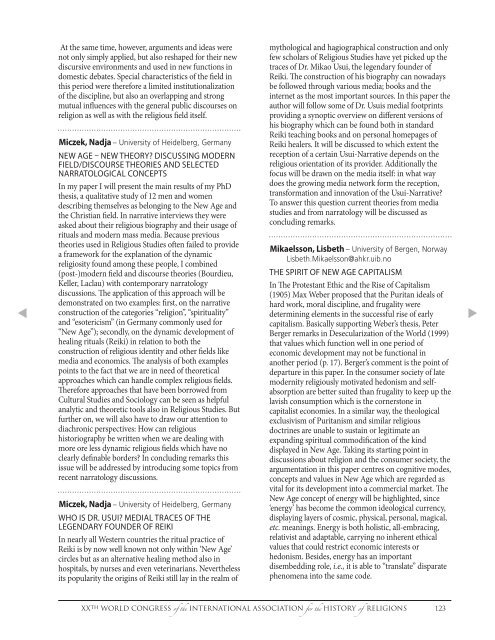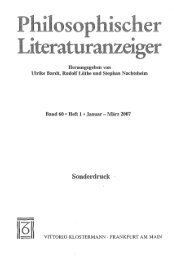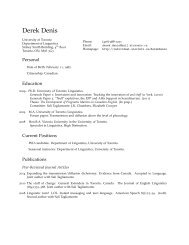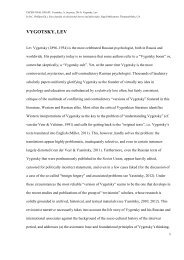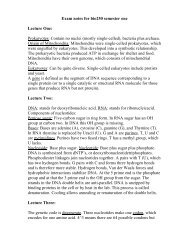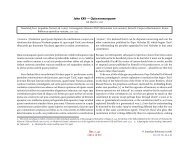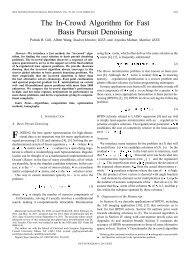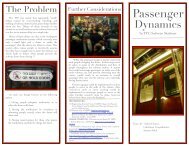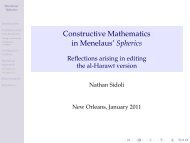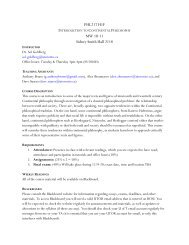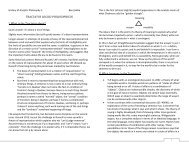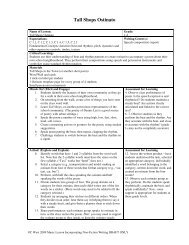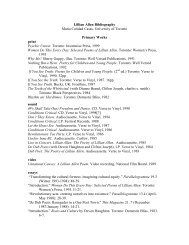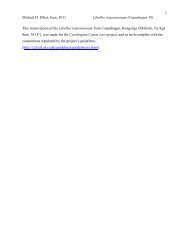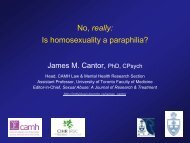BOOK of ABSTRACTS XXTh WORld COngReSS InTeRnATIOnAl ...
BOOK of ABSTRACTS XXTh WORld COngReSS InTeRnATIOnAl ...
BOOK of ABSTRACTS XXTh WORld COngReSS InTeRnATIOnAl ...
Create successful ePaper yourself
Turn your PDF publications into a flip-book with our unique Google optimized e-Paper software.
At the same time, however, arguments and ideas were<br />
not only simply applied, but also reshaped for their new<br />
discursive environments and used in new functions in<br />
domestic debates. Special characteristics <strong>of</strong> the field in<br />
this period were therefore a limited institutionalization<br />
<strong>of</strong> the discipline, but also an overlapping and strong<br />
mutual influences with the general public discourses on<br />
religion as well as with the religious field itself.<br />
Miczek, Nadja – University <strong>of</strong> Heidelberg, Germany<br />
neW age – neW tHeory? discussing modern<br />
field/discourse tHeories and selected<br />
narratological concePts<br />
In my paper I will present the main results <strong>of</strong> my PhD<br />
thesis, a qualitative study <strong>of</strong> 12 men and women<br />
describing themselves as belonging to the New Age and<br />
the Christian field. In narrative interviews they were<br />
asked about their religious biography and their usage <strong>of</strong><br />
rituals and modern mass media. Because previous<br />
theories used in Religious Studies <strong>of</strong>ten failed to provide<br />
a framework for the explanation <strong>of</strong> the dynamic<br />
religiosity found among these people, I combined<br />
(post-)modern field and discourse theories (Bourdieu,<br />
Keller, Laclau) with contemporary narratology<br />
discussions. The application <strong>of</strong> this approach will be<br />
demonstrated on two examples: first, on the narrative<br />
construction <strong>of</strong> the categories “religion”, “spirituality”<br />
and “esotericism” (in Germany commonly used for<br />
“New Age”); secondly, on the dynamic development <strong>of</strong><br />
healing rituals (Reiki) in relation to both the<br />
construction <strong>of</strong> religious identity and other fields like<br />
media and economics. The analysis <strong>of</strong> both examples<br />
points to the fact that we are in need <strong>of</strong> theoretical<br />
approaches which can handle complex religious fields.<br />
Therefore approaches that have been borrowed from<br />
Cultural Studies and Sociology can be seen as helpful<br />
analytic and theoretic tools also in Religious Studies. But<br />
further on, we will also have to draw our attention to<br />
diachronic perspectives: How can religious<br />
historiography be written when we are dealing with<br />
more ore less dynamic religious fields which have no<br />
clearly definable borders? In concluding remarks this<br />
issue will be addressed by introducing some topics from<br />
recent narratology discussions.<br />
Miczek, Nadja – University <strong>of</strong> Heidelberg, Germany<br />
WHo is dr. usui? medial traces <strong>of</strong> tHe<br />
legendary founder <strong>of</strong> reiki<br />
In nearly all Western countries the ritual practice <strong>of</strong><br />
Reiki is by now well known not only within ‘New Age’<br />
circles but as an alternative healing method also in<br />
hospitals, by nurses and even veterinarians. Nevertheless<br />
its popularity the origins <strong>of</strong> Reiki still lay in the realm <strong>of</strong><br />
mythological and hagiographical construction and only<br />
few scholars <strong>of</strong> Religious Studies have yet picked up the<br />
traces <strong>of</strong> Dr. Mikao Usui, the legendary founder <strong>of</strong><br />
Reiki. The construction <strong>of</strong> his biography can nowadays<br />
be followed through various media; books and the<br />
internet as the most important sources. In this paper the<br />
author will follow some <strong>of</strong> Dr. Usuis medial footprints<br />
providing a synoptic overview on different versions <strong>of</strong><br />
his biography which can be found both in standard<br />
Reiki teaching books and on personal homepages <strong>of</strong><br />
Reiki healers. It will be discussed to which extent the<br />
reception <strong>of</strong> a certain Usui-Narrative depends on the<br />
religious orientation <strong>of</strong> its provider. Additionally the<br />
focus will be drawn on the media itself: in what way<br />
does the growing media network form the reception,<br />
transformation and innovation <strong>of</strong> the Usui-Narrative?<br />
To answer this question current theories from media<br />
studies and from narratology will be discussed as<br />
concluding remarks.<br />
Mikaelsson, Lisbeth – University <strong>of</strong> Bergen, Norway<br />
Lisbeth.Mikaelsson@ahkr.uib.no<br />
tHe sPirit <strong>of</strong> neW age caPitalism<br />
In The Protestant Ethic and the Rise <strong>of</strong> Capitalism<br />
(1905) Max Weber proposed that the Puritan ideals <strong>of</strong><br />
hard work, moral discipline, and frugality were<br />
determining elements in the successful rise <strong>of</strong> early<br />
capitalism. Basically supporting Weber’s thesis, Peter<br />
Berger remarks in Desecularization <strong>of</strong> the World (1999)<br />
that values which function well in one period <strong>of</strong><br />
economic development may not be functional in<br />
another period (p. 17). Berger’s comment is the point <strong>of</strong><br />
departure in this paper. In the consumer society <strong>of</strong> late<br />
modernity religiously motivated hedonism and selfabsorption<br />
are better suited than frugality to keep up the<br />
lavish consumption which is the cornerstone in<br />
capitalist economies. In a similar way, the theological<br />
exclusivism <strong>of</strong> Puritanism and similar religious<br />
doctrines are unable to sustain or legitimate an<br />
expanding spiritual commodification <strong>of</strong> the kind<br />
displayed in New Age. Taking its starting point in<br />
discussions about religion and the consumer society, the<br />
argumentation in this paper centres on cognitive modes,<br />
concepts and values in New Age which are regarded as<br />
vital for its development into a commercial market. The<br />
New Age concept <strong>of</strong> energy will be highlighted, since<br />
‘energy’ has become the common ideological currency,<br />
displaying layers <strong>of</strong> cosmic, physical, personal, magical,<br />
etc. meanings. Energy is both holistic, all-embracing,<br />
relativist and adaptable, carrying no inherent ethical<br />
values that could restrict economic interests or<br />
hedonism. Besides, energy has an important<br />
disembedding role, i.e., it is able to “translate” disparate<br />
phenomena into the same code.<br />
XX tH WORLd CONGREss <strong>of</strong> the INtERNAtIONAL AssOCIAtION for the HIstORy <strong>of</strong> RELIGIONs<br />
123


